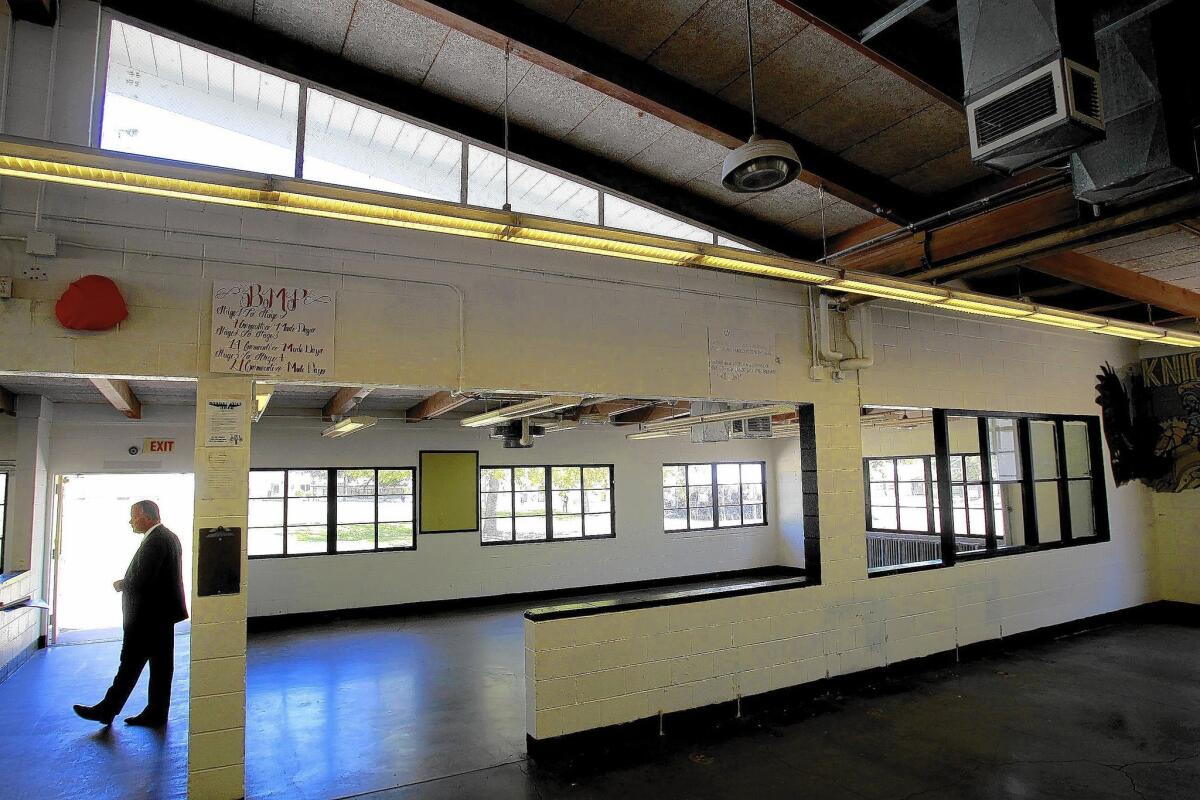Demolition of Camp Vernon youth lockup called start of new era

- Share via
Los Angeles County officials marked what they describe as the beginning of a new era in juvenile justice Friday by breaking ground on the demolition of Camp Vernon Kilpatrick, a 50-year-old juvenile lockup outside Malibu.
The 125-bed camp is set to be razed and remade in a $48-million project that officials and advocates say will create a facility better set up to rehabilitate young offenders.
“Rehabilitative, not punitive — that’s the message, and that’s the model that this camp is going to be the poster child for when it’s completed,” said county Supervisor Zev Yaroslavsky.
Before the lockup in the Malibu hills closed for demolition, its barracks-like dormitories with cinder block walls and concrete floors held dozens of young inmates. Bunks surrounded a central command post from which probation officers would keep an eye on the room. Most of the county’s 13 other juvenile camps are similarly configured, with some holding 100 or more youth in each dormitory. County officials said Kilpatrick was targeted for reconstruction first because its aging buildings had become expensive to maintain. The project will be partially funded by a $29-million state grant.
Ralphica Garnett, 20, a youth organizer with the Children’s Defense Fund and the Youth Justice Coalition, said she had done time in county probation camps beginning at age 12. She recalled the crowded sleeping quarters as “chaotic” and “depressing.”
“There’s no quiet time,” she said. “You never get a chance to be noticed as an individual… We need a more homelike setting. Kids need to feel at home and feel safe.”
At Kilpatrick, the dorms will be replaced with cottages housing groups of no more than 12 teens who will go through classes, counseling and other daily activities together. Advocates say the small-group model allows the youth to form stronger bonds with staff and each other, and has been successful in other parts of the country. If the Kilpatrick project is successful, county probation officials hope to replicate the new “L.A. model” at juvenile camps throughout the county.
“This is the blueprint for our future,” Chief Probation Officer Jerry Powers said.
The Kilpatrick project has been in the works for years, with several delays and stutters along the way. Powers said when he took over the department three years ago, the initiative was “not even on the back burner. It was in a back drawer somewhere.” He asked the Board of Supervisors to resurrect it. The Probation Department had been under federal scrutiny over conditions in its juvenile camps and halls. Powers said he believed remaking Kilpatrick would show critics that the department was serious about reform.
The Probation Department — along with other county agencies — undertook a nearly yearlong process of talks with community members and youth advocates to develop the vision for the new facility.
Last year, supervisors complained about the slow pace of the project and voted to speed up the timeline by allowing the design and construction contract to be awarded to a single firm. Officials with the Department of Public Works said the three finalists for the contract would be interviewed early next month, with the board expected to award the contract in November.
Construction is scheduled to be finished in late 2016, and the new camp is set to open in January 2017.
Along with the newly configured housing units, the rebuilt camp will include a new gymnasium and outdoor sports facilities. Kilpatrick has a one-of-a kind sports program that was memorialized in the 2006 film “Gridiron Gang” — but the camp’s gym has not been functional since the 1994 Northridge earthquake.
The sports program has moved to Challenger Memorial Youth Camp in Lancaster while the reconstruction of Kilpatrick is underway.
Camp Miller, an adjacent probation facility that shares a kitchen with Kilpatrick and houses about 30 youth, is not part of the rebuild project.
[email protected]
Twitter: @sewella
More to Read
Sign up for Essential California
The most important California stories and recommendations in your inbox every morning.
You may occasionally receive promotional content from the Los Angeles Times.











